Judicial Determination and Trial Practice of the Crime of Illegally Engaging in Similar Businesses
Recently, the frequent occurrence of corruption cases has sparked the author's interest in re researching job related crimes. In China's Criminal Law, there is a separate chapter, Chapter 8, which summarizes the crimes of corruption and bribery, including the well-known crimes of corruption, bribery, bribery, and so on. The legal community has also conducted the most research on these common charges. However, in the chapter of the crime of disrupting the order of the Socialist market economy in the third chapter, there is another crime that corrupt people may be involved in, namely, the crime of illegally operating similar businesses. Regarding this accusation, legal professionals have not paid much attention and research is also limited. In view of this, the author briefly summarizes the determination and trial practice of this charge, in order to help everyone further understand this charge.
Part One: Judicial Determination of the Crime of Illegal Operation of Similar Businesses
Article 165 of the Criminal Law of China [Crime of illegally operating similar businesses]: If a director or manager of a state-owned company or enterprise takes advantage of his position to operate or for others to operate similar businesses to the company or enterprise he serves, and obtains illegal benefits, and the amount involved is huge, he shall be sentenced to fixed-term imprisonment of not more than three years or criminal detention and shall also, or shall only, be fined; If the amount is particularly huge, he shall be sentenced to fixed-term imprisonment of not less than three years but not more than seven years and shall also be fined.
1、 Prosecution standards
The newly revised "Filing and Prosecution Standards (2)" no longer include charges under the exclusive jurisdiction of supervisory authorities such as the crime of illegally operating similar businesses, so there is currently no clear filing standard for this crime. Before the introduction of the new prosecution standards, the provisions of Article 12 of the "Filing and Prosecution Standards (II)" can be referred to accordingly, while cases after the introduction of the new prosecution standards should be handled according to the principle of "treating both the old and the lighter".
2、 Criminal subject
The subject of this crime is a special subject, namely the directors and managers of state-owned companies and enterprises. To gain a deeper understanding of this sentence, we need to explore the following aspects.
Firstly, what is "state-owned company, enterprise"? The meaning of "state-owned companies and enterprises" in criminal law only refers to solely state-owned companies and enterprises, which is already clear in the Criminal Trial Reference No. 187 Yang Wenkang Illegal Operation of Similar Business Case. In this guiding case, it is stated that all investors (shareholders) of overseas companies must be state-owned units. Firstly, it is believed that the company, as an independent corporate entity established in accordance with the law, with profit as its purpose, and shareholder investment as its foundation, has independent legal personality and autonomy in managing, earning, and disposing of its assets. After the company is established in accordance with the law, the shareholders' contributions shall be deemed as the property of the company, and the company shall exercise ownership independently and uniformly. And shareholders obtain corresponding equity based on their contribution shares. Therefore, if a state-owned limited liability company with a majority of state-owned assets is recognized as a "state-owned company", it not only negates the independent legal personality of the company, but also ignores the subject qualifications and equity interests of other investors; Secondly, whether state-owned assets hold shares and whether state-owned assets are in a dominant position in the company only indicates the share of state-owned assets in the company. While this share of equity is owned and exercised by the state, it is essentially a form of state participation and cannot be classified as state-owned.
Secondly, does a director or manager who is controlled or shares held by the state not constitute this crime? The answer is no. In the case No. 1298 of Wu Xiaojun's illegal operation of similar businesses and bribery of non-state workers, it was pointed out that in the criminal law sense, "state-owned companies and enterprises" are still limited to solely state-owned companies and enterprises, but the extension of "state-owned companies and enterprise personnel" has been adjusted. A person who is dispatched to a state-owned enterprise to engage in public service may not be recognized as a "state-owned company or enterprise" within the meaning of the Criminal Law, and even the unit appointing him is not a "state-owned company or enterprise". However, if he meets specific conditions, he/she can still be recognized as a "state-owned company or enterprise personnel". The so-called compliance with specific conditions is mainly examined from the following three aspects: first, the delegated subject. The qualified appointing entity should be a state-owned company, enterprise, or an organization in a state-owned holding or participating company responsible for managing and supervising state-owned assets; The second is the substantive content of the appointment, which is whether the appointment reflects the will of state-owned units and organizations. The specific form of appointment and whether the appointed unit has appointed the appointed personnel through specific procedures do not affect the determination of appointment; The third is whether to engage in public affairs, mainly reflected in "organizing, leading, supervising, operating, and managing work".
Third, is it possible for Middle management of state-owned companies and enterprises to constitute this crime? According to the provisions of the Company Law, directors include the chairman, vice chairman, executive director, and other directors of the board of directors. The manager includes the general manager and deputy manager. Personnel holding the above-mentioned positions in state-owned companies and enterprises may all constitute this crime. However, in the guidance case No. 187, it is clear that Middle management such as department managers of state-owned companies and enterprises generally do not constitute the subject of the crime of illegal operation of similar businesses.
3、 Object
The object of this crime is the act of using the convenience of one's position to operate a business similar to that of the company or enterprise they serve, or to obtain illegal benefits for others, resulting in a huge amount of money. Article 148 of the Company Law stipulates the "non compete obligation" of directors and senior management personnel. The fifth paragraph of this article refers to the use of position to seek business opportunities belonging to the company for oneself or others without the consent of the shareholders' meeting or shareholders' meeting, and to engage in business similar to the company for oneself or others. This crime is the connection between the provisions of this article, aimed at cracking down on the behavior of directors and managers of state-owned companies and enterprises who violate their non compete obligations, use their positions to facilitate the operation of businesses similar to the companies they serve, obtain illegal benefits, and seize or harm the interests of state-owned companies.
Similar businesses refer to businesses that belong to the same category of business. On the surface, whether the business scope in the industrial and commercial registration overlaps or whether it belongs to the same category in the National Economic Industry Classification can be used to determine whether it belongs to the same type of business. However, in practice, it should be judged from the substantive level of the non compete rule, that is, whether it affects the trading opportunities of the enterprise in which it operates. For example, in Guidance Case No. 1298, it was pointed out that "similar business" is not "the same business". If the perpetrator, by taking advantage of their position to obtain trading opportunities with the opposite party, fails to report to the company, deprives the company of trading opportunities and takes them as their own, it belongs to the operation of similar business. Even if the same type of business exceeds the statutory business scope of our company, as long as it does not violate national prohibitive regulations, it does not affect the determination of the nature of illegal operation of the same type of business.
4、 The difference between this crime and the crime of illegally profiting for family and friends
Article 166 of the Criminal Law stipulates the crime of illegally making profits for relatives and friends, which refers to the behavior of staff members of state-owned companies, enterprises, and institutions who, taking advantage of their position, entrust their profitable business to their relatives and friends for operation, or engage in purchasing and selling activities that are clearly beneficial to the other party, causing significant losses to national interests. There are three specific behaviors: (1) entrusting the profitable business of the unit to one's own relatives and friends for operation; (2) Purchasing goods from units operated and managed by one's own relatives and friends at prices significantly higher than the market, or selling goods to units operated and managed by one's own relatives and friends at prices significantly lower than the market; (3) Purchasing substandard products from units managed by one's own relatives and friends.
In Guidance Case No. 187, it was pointed out that, Some directors and managers of state-owned companies or enterprises, taking advantage of their positions, entrust their profitable business to their relatives and friends' companies or enterprises. They also participate in the operation, obtain huge illegal benefits from it, and cause significant losses to the national interests. Therefore, one crime should be convicted and punished according to the specific situation. The two crimes have different constitutive requirements, one is profit, and the other is loss. If there is only one, the one who has it will be convicted; if there are two, the one who has it will be convicted If all behaviors are met, it can be convicted of illegally operating similar businesses
5、 Definition of obtaining illegal benefits
The crime of illegally operating similar businesses requires the perpetrator to obtain illegal benefits. Obtaining illegal benefits must have a direct corresponding relationship with its business activities, specifically manifested as operating profits or operating remuneration. In judicial practice, the author has found the following ways to identify illegal gains:
Secondly, use personal illegal gains as the basis for identification. The recognition is based on the amount received by the perpetrator after illegally operating similar businesses. At the same time, the author found that in some cases, the costs incurred when establishing self operated or other operated companies can also be deducted accordingly.
Thirdly, if both operating profit and personal illegal income data appear in the case, which one is the main one? In response to this issue, the author quite agrees with the views expressed in the (2014) Hong Xing Chu Zi No. 875 judgment, In this case, the judge held that: "The purpose of this crime is mainly to maximize the interests of state-owned companies and enterprises and prevent Unfair competition. The directors and managers of state-owned companies and enterprises use their positions to operate similar businesses, which results in self operated companies, other companies and enterprises obtaining interests, and state-owned companies and enterprises suffering damage. Therefore, the illegal interests in this crime should be the quantitative expression of the degree of infringement on the object of this crime, that is, illegal interests The amount of benefits should comprehensively reflect the social harmfulness of illegal operation of similar business activities. For example, the Personal income theory is adopted, because Personal income is only a part of illegal profits, in this case, the amount of Personal income does not fully reflect the social harmfulness of illegal business operations of the same kind. In particular, some directors and managers of state-owned companies and enterprises operate for others out of friendship and kinship and do not receive any remuneration. How to calculate "Personal income". It can be seen that taking Personal income as the standard, it is not only difficult to comprehensively reflect the social harmfulness of illegal business operations of the same kind, but also provides a convenient way for the perpetrator to avoid the punishment of this crime. To sum up, the illegal interests in this crime should refer to the illegal profits of self operated companies, other companies and enterprises. Only when other companies and enterprises do not make profits, the illegal interests refer to the Personal income of directors and managers. "
Part 2: Trial Practice
The author searched for a total of 17 cases (all of which were ultimately determined to constitute this crime) using the charges of this crime as the search criteria in the Weike Advance Database, including one case that was not publicly disclosed due to involving state secrets. In addition to 17 cases, there is also one case where the retrial court deemed it to be an attempted crime and the circumstances were significantly minor, which did not constitute a crime. Therefore, the original judgments of the first and second trials were revoked, and the defendant was acquitted. The following is a summary of 17 cases.
1、 Time distribution of the number of incidents
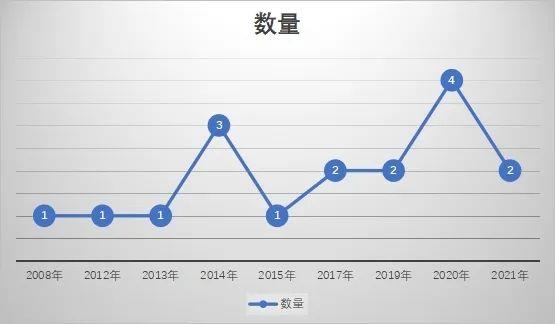
From the above figure, it can be seen that the number of cases in 2020 was 4, while in other years it remained basically the same.
2、 Regional distribution of the number of cases
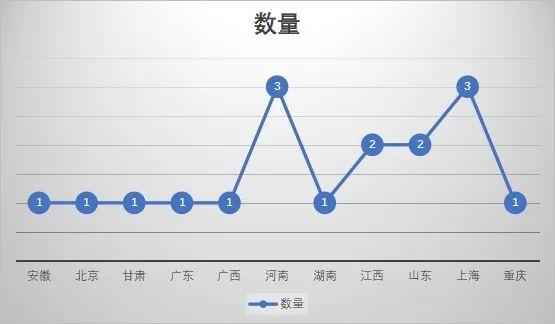
From the above figure, it can be seen that the number of cases in Henan and Shanghai is relatively high, both of which are 3, while the number of cases in other regions is basically the same.
3、 Distribution of illegal gains
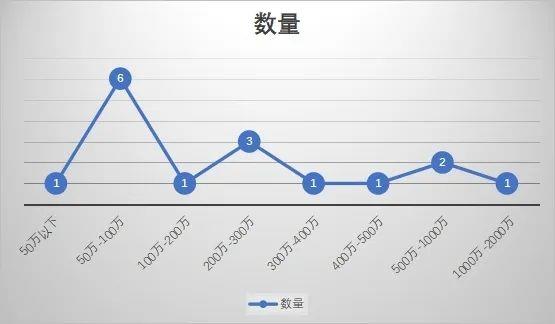
From the above figure, it can be seen that there are six illegal gains ranging from 500000 to 1 million. The second highest is between 2 million and 3 million, followed by 3.
4、 Distribution of Judgment Results
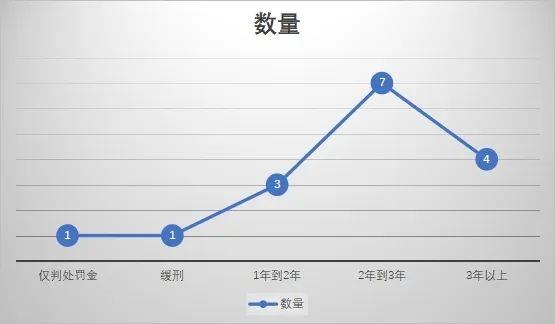
According to Article 165 of the Criminal Law, if the amount involved is huge, he shall be sentenced to fixed-term imprisonment of not more than three years or criminal detention and shall also, or shall only, be fined; If the amount is particularly huge, he shall be sentenced to fixed-term imprisonment of not less than three years but not more than seven years and shall also be fined. Based on the above analysis, this crime can be prosecuted for 100000 yuan, which is a huge amount. As for the amount of illegal gains, which is particularly huge, there is currently no relevant regulation. After investigation, the minimum amount of illegal gains in sentences sentenced to more than 3 years is over 1.6 million yuan. Throughout corruption and bribery crimes, there is no unified standard for large or particularly large criminal amounts, with various amounts ranging from 1 million, 2 million, and 3 million. From the comparison between the prison term and illegal gains alone, the author cannot draw a conclusion about which category the amount is particularly large, so legislation on this issue still needs to be improved.
5、 Distribution of fines
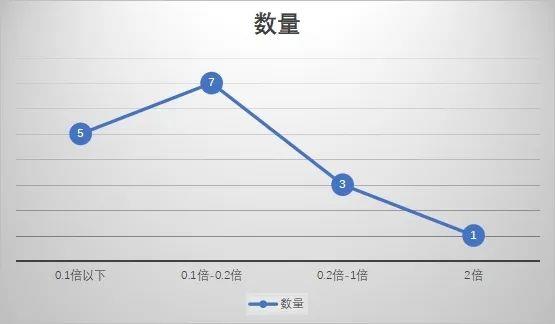
From the above figure, it can be seen that there are 7 cases where fines are between 0.1 and 0.2 times the illegal gains; There are 5 below 0.1 times. The only case with a double relationship was because the case did not impose a sentence, and the court ultimately only imposed a fine. In the case, the minimum penalty amount is 30000 yuan. In the crime of corruption and bribery, except for corruption and bribery, the fine for other corruption and bribery crimes is basically over 100000 yuan and less than twice the amount of the crime. From the retrieved cases alone, it can only be concluded that the fine is over 30000 yuan and the crime amount is less than twice. However, this conclusion is only an analysis of the case results and does not have specific provisions to support it. The amount of fines also needs to be determined by legal regulations.
Related recommendations
- Tax lawyers review the draft of the revised Tax Collection and Administration Law for soliciting opinions
- New Measures for Punishing "Dishonesty" by the Supreme People's Court at the Two Sessions in 2025 (Part 3): "Height Limit" Single Release Mechanism
- New Measures for Punishing "Dishonesty" by the Supreme People's Court at the Two Sessions in 2025 (Part 2): Grace Period System
- Interpretation of the Management Measures for Compliance Audit of Personal Information Protection - Feeling the Rhythm and Rhythm of Regulatory Flow



